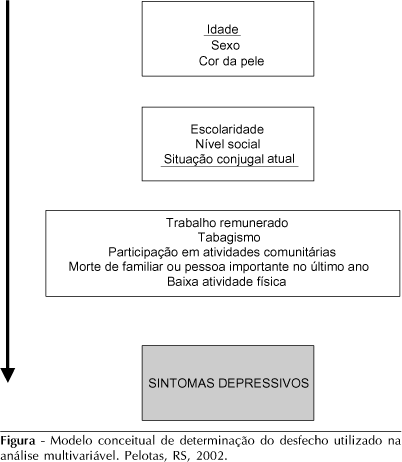OBJECTIVE: To determine the frequency of some depressive symptoms in the elderly, to build up a score of depressive symptoms and to evaluate the association between depressive symptoms and demographic, socioeconomic and behavioral variables. METHODS:A population-based cross-sectional study was conducted in individuals aged 60 and more living in the urban city area of Pelotas, Brazil. The sample was selected in multiple stages based on the city's census tracts. It was used a questionnaire comprising eight question commonly included in depression evaluation instruments and specific to the elderly. Analyses were carried out using multiple linear regressions following a hierarchical approach. RESULTS: A total of 583 subjects were interviewed and non-response rate was 4.7%. Each participant had on the average score of depressive symptoms was 3.4 (SD 2.1)Lack of willingness to carry out daily activities was the most frequent symptom (73.9%) reported. In the adjusted analysis according to the conceptual framework, the following groups had statistically higher averages (p<0,05) of depressive symptoms: older women, individuals with less schooling, unemployed, smokers, and those whose family member or significant other died in the past year. CONCLUSIONS: It was found both high rates of isolated symptoms and high average of depressive symptoms in the study sample, highlighting the importance of studying specific symptoms of the elderly, which are different from those found in young adults.
Depression; Aged; Mental health; Aging health; Cross-sectional studies



